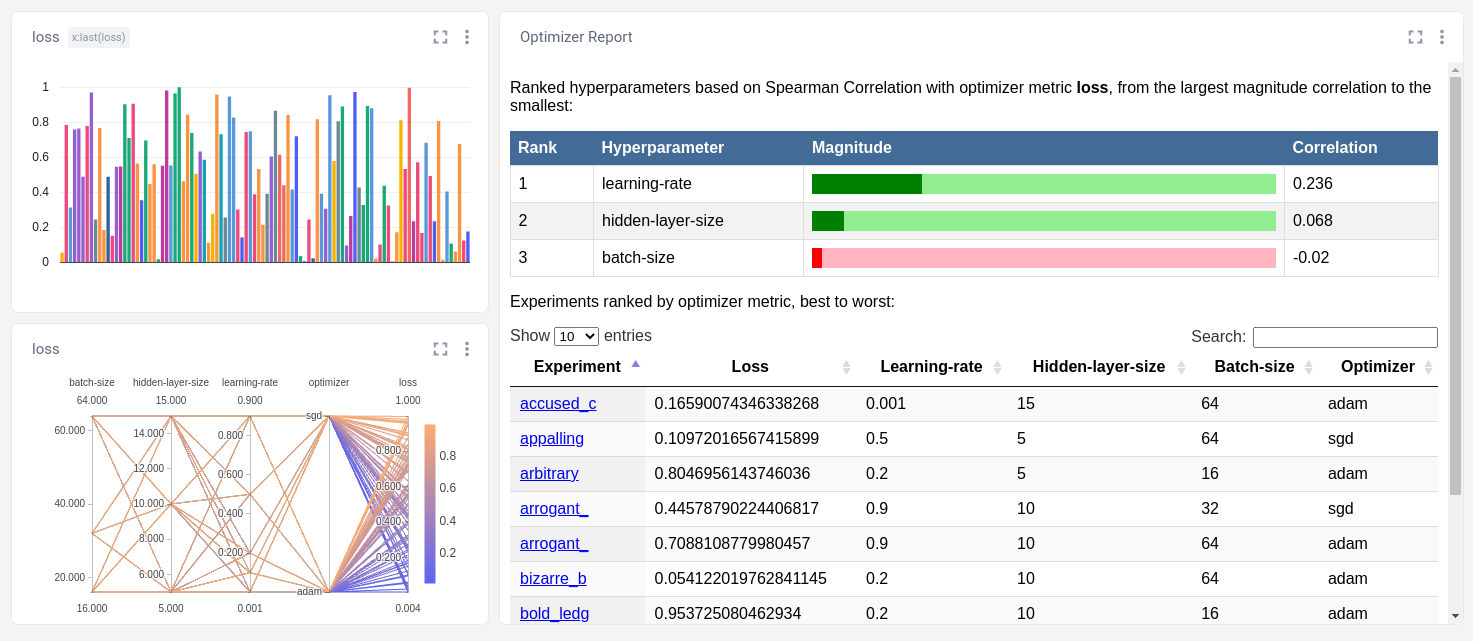Although Comet provides a powerful Hyperparameter Optimizer designed for experiment management and different search algorithms (including random, grid, and bayes), you can also use your own, or any third-party optimizer/search system.
When you create an Experiment with Comet's Optimizer, you also get the support of a number of related tools, including the Optimizer Report Panel and Parallel Coordinate Report:

However, you can also use these related tools with your own optimizer. You need only make sure that all of the hyperparameters are logged, and log these additional "other" items:
```python import json, os
parameters is a dict of hyperparameter names/values¶
experiment is a Comet experiment¶
experiment.log_other("optimizer_metric", "loss") # name of metric experiment.log_other("optimizer_metric_value", 0.7) experiment.log_other("optimizer_version", "diy-1.0") # your own info experiment.log_other("optimizer_process", os.getpid()) # if you wish experiment.log_other("optimizer_count", 23) # the combination count so far experiment.log_other("optimizer_objective", objective) # "minimum" or "maximum" experiment.log_other("optimizer_parameters", json.dumps(parameters)) # string of parameters experiment.log_other("optimizer_name", "optional-name") # string ```
Below you will find a complete, but simple, Do It Yourself (DIY) example search algorithm. Note that there are many limitations to this, including:
- when selecting a combination randomly, all combinations are in memory and could crash your computer if there are too many
- if a training example doesn't complete (e.g. it crashes) then there is no mechanism to try the combination again
- only runs one trial for each combination
- can't be used in a distributed manner (need a centralized server to provide combinations)
- only does random and grid search, not a sophisticated Bayes search
You can substitute a proper hyperparameter search for this simple version. Of course, Comet's Optimizer solves all of the above issues.
```python
A DIY Hyperparameter search¶
from comet_ml import Experiment
import itertools import json import random import os
def get_parameters(params, shuffle=True): """ Return a dictionary of parameter settings given lists of possible values for each.
Args:
params: dict of lists of possible values
shuffle: bool; if True, shuffle the value orders
Returns a dict of key/value for each combination.
"""
if shuffle:
combinations = []
for values in itertools.product(*params.values()):
combinations.append(dict(zip(params, values)))
random.shuffle(combinations)
for combo in combinations:
yield combo
else:
for values in itertools.product(*params.values()):
yield dict(zip(params, values))
hyperparameters = { "learning-rate": [0.001, 0.1, 0.2, 0.5, 0.9], "batch-size": [16, 32, 64], "hidden-layer-size": [5, 10, 15], "optimizer": ["adam", "sgd"], }
def train(**hyperparams): # a dummy training function that returns loss return random.random()
count = 0 metric_name = "loss" objective = "minimize" for parameters in get_parameters(hyperparameters): count += 1 experiment = Experiment(project_name="diy-search") experiment.log_parameters(parameters) metric_value = train(**parameters) experiment.log_metric(metric_name, metric_value, step=0)
experiment.log_other("optimizer_metric", metric_name)
experiment.log_other("optimizer_metric_value", metric_value)
experiment.log_other("optimizer_version", "diy-1.0")
experiment.log_other("optimizer_process", os.getpid())
experiment.log_other("optimizer_count", count)
experiment.log_other("optimizer_objective", objective)
experiment.log_other("optimizer_parameters", json.dumps(parameters))
experiment.log_other("optimizer_name", "diy-optimizer-001")
```
For more information on Comet's Optimizer, please see: